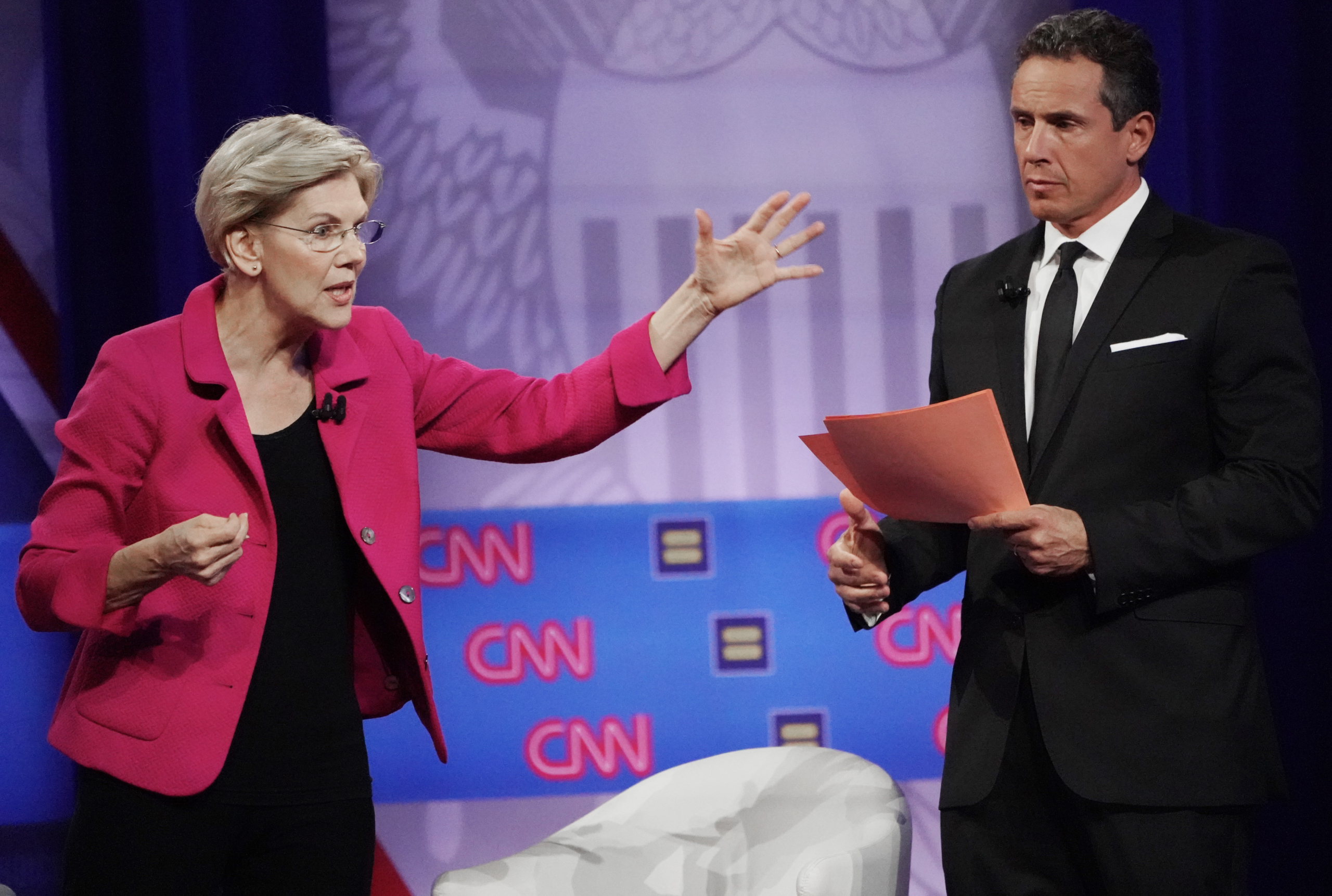Sign up for The Media Today, CJR’s daily newsletter.
Marginalized communities are rarely mentioned in questions put to presidential candidates. But last night, CNN’s town hall, held in Los Angeles, provided an unprecedented chance for members of the LGBTQ community to address problems specific to their lives on a national stage.
Nine Democratic candidates participated, each given a 30-minute segment. Some capitalized on the opportunity and showed an understanding of the reality LGBTQ Americans face. But because candidates had to react to questions in real time, others put their ignorance on full display. The night had highs and lows, both for the candidates and the rotating moderators—Chris Cuomo, Anderson Cooper, Don Lemon, Dana Bash, and Nia-Malika Henderson.
ICYMI: “I had to rewind this to believe what I was hearing”: The media’s missteps in Ukrainegate
Pete Buttigieg, the first openly gay presidential candidate, tied his personal story with policy proposals. Buttigieg, the mayor of South Bend, Indiana, described his own coming out process: “What it was like was a civil war, because I knew I was different long before I knew I was gay.” Hours prior to the debate, Buttigieg unveiled an LGBTQ policy plan that promised to back the passage of the Equality Act, which prevents job and housing discrimination. When answering a question about religious liberty, he said, “The right to religious freedom ends where religion is being used as an excuse to harm other people.” The reply drew applause from the crowd.
Senator Elizabeth Warren also released an LGBTQ equality plan earlier that day. When she was asked about a statement she’d made during her 2012 senate campaign—that transition-related surgeries for trans inmates would not be a good use of taxpayer dollars—she said, “It was a bad answer.” Warren was behind what was perhaps the most viral moment of the night, when a member of the audience asked how she would respond to a hypothetical supporter telling her, “marriage is between one man and one woman.” Her response lit up social media: “Well, I’m going to assume it’s a guy who said that. And I’m going to say, well, just marry one woman.” Then she added, “Assuming you can find one.”
This Elizabeth Warren answer was quite a moment at CNN #EqualityTownHall pic.twitter.com/ThpI7YSO8M
— MJ Lee (@mj_lee) October 11, 2019
Other town hall moments, however, were noted for their tone-deafness. Former Vice President Joe Biden was asked simple questions about reducing violence against the LGBTQ community and addressing the ban on trans troops in the military, which Donald Trump restored. In his answers, Biden rambled and ventured off subject. At the end of his time slot, he was asked how he would tackle the high HIV rates among gay men of color, particularly in the South. He started his response by speaking about a health care plan that would support people with HIV. He then began discussing how acceptance of the LGBTQ community has evolved. Then, addressing Cooper, he said, “remember, Anderson, back 15, 20 years ago, we talked about this—in San Francisco, was all about, well, you know, gay—gay bathhouses. And everybody—‘it’s all about around-the-clock sex.’ It’s all—come on, man. Gay couples are more likely to say together longer than heterosexual couples.” Cooper deadpanned, “We’re gonna leave it there, Mr. Vice President,” ending the session.
The most-discussed gaffe during the town hall wasn’t made by one of the candidates. When Senator Kamala Harris walked onstage, she said: “My pronouns are she, her, and hers.” Cuomo asked, “She, her and hers?” She nodded, then Cuomo replied: “Mine, too.” He was quickly criticized for the comment, and later posted an apology on Twitter.
KAMALA HARRIS: My pronouns are she, her and hers.
CHRIS CUOMO: Mine, too.
HARRIS: Alright. pic.twitter.com/09gJ2pygjd
— Dan Diamond (@ddiamond) October 11, 2019
At various points, protesters interrupted the candidates. They had come to highlight the deaths of trans women of color. While Beto O’Rourke, a former House representative, was speaking, a woman named Blossom C. Brown took the mic from another audience member. “Black trans women are dying,” she said. “Our lives matter. I am an extraordinary Black trans woman, and I deserve to be here.” When Buttigieg took the stage, protesters began waving signs and shouting about the rash of murders in which Black trans women have been targeted. These outbursts, which might have been seen as disruptions, were instead welcomed by the candidates and the moderators; the headlines covering these moments increased visibility of the problem. And the calls for attention were well worth noticing: over the course of the evening, candidates touched on LGBTQ workplace discrimination, HIV rates among men of color, conversion therapy, and the ban on trans troops in the military. But it appeared unlikely that they would have touched on the deaths of Black trans women—that evening, Ashlee Marie Preston, a trans activist, said on Twitter that she’d been initially offered an opportunity to pose a question, and then it was withdrawn. (When reached for comment CNN did not respond by publication time.)
The town hall, a hefty block of programming for CNN, was an opportunity: candidates weren’t confined by the time limits of debates, allowing them to expand on their policies and show what they know. It was also revealing. Democrats have been criticized for assuming they will be able to win minority voters without actually helping minority voters. The town hall indicated that in order to get that support, candidates are going to have to work harder.
ICYMI: What actually is CNN?
Has America ever needed a media defender more than now? Help us by joining CJR today.



